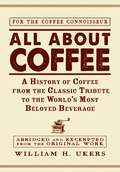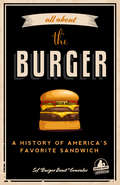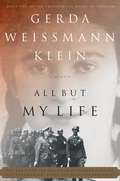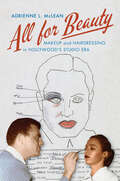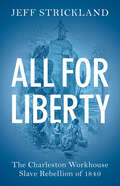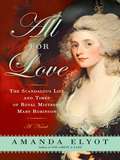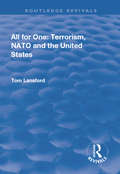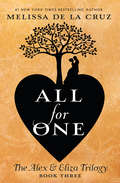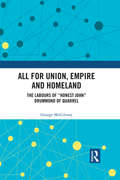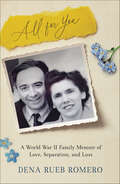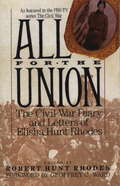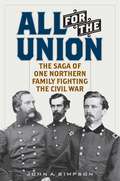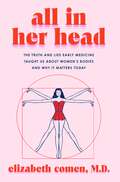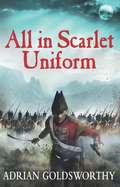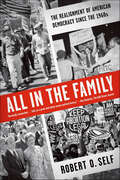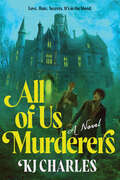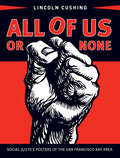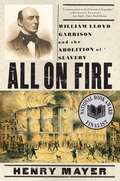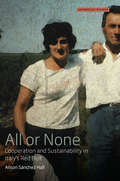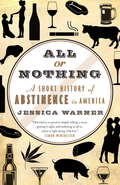- Table View
- List View
All about Coffee
by William H. UkersThe original homage to the world's most extraordinary drink! In 1922, William H. Ukers wrote the definitive work on coffee. As the founder of The Tea and Coffee Trade Journal, an industry magazine still active today, he spent seventeen years traveling the world and uncovering everything there was to know about both the bean and the beverage. From its historic roots and the drinking customs of different countries to its effects on the mind and the preparation of the perfect cup, this book captures all the rich and complex history of coffee. Filled to the brim with robust facts, aphorisms, and more, All About Coffee culls the best of Ukers's research and observations sip after sip, page after page.
All about Coffee: A History of Coffee from the Classic Tribute to the World's Most Beloved Beverage
by William H UkersThe original homage to the world's most extraordinary drink!In 1922, William H. Ukers wrote the definitive work on coffee. As the founder of The Tea and Coffee Trade Journal, an industry magazine still active today, he spent seventeen years traveling the world and uncovering everything there was to know about both the bean and the beverage. From its historic roots and the drinking customs of different countries to its effects on the mind and the preparation of the perfect cup, this book captures all the rich and complex history of coffee.Filled to the brim with robust facts, aphorisms, and more, All About Coffee culls the best of Ukers's research and observations sip after sip, page after page.
All about the Burger: A History of America's Favorite Sandwich
by Sef GonzalezFrom conception to perfection, a complete history of the hamburger, for fans of Mark Kurlansky, Tom Standage, Jared Diamond, and Bee Wilson. Discover the food history you've been missing in this entertaining book. Do you know what the first burger chain was? That Taco Bell was originally known as Bell Burger—and was founded in the same city as McDonald's? Have you heard of the 1980s Burger Wars? All About the Burger covers all these topics and more…All About the Burger will take you on the burger journey of a lifetime, an informational magic carpet ride. You&’ll learn about restaurants, cooking styles, and different eras that have made the burger the juggernaut that it is. From White Castle to Shake Shack, from simple sandwich to specialty burger, you won&’t miss a bite. This is the definitive Bible of Burgers. After reading this book, you will learn:· The contributions burgers have made to food culture· The evolution of the burger from carnival treat to an American staple· Where to go to find your next favorite burger· And much more!Praise for All about the Burger &“Sef&’s pursuit of the real story, along with the way he writes about the histories of these storied American restaurants and companies, truly conveys the respect and love he has for the subject.&”―Bob Gatewood and Brian Easley, president & vice president at Druther&’s &“A book so meticulously researched and passionately written, it is the crowning achievement of one of our greatest food authorities. You will devour it instantly.&”―Lee Schrager, Food Network&’s South Beach Wine & Food Festival, founder
All but My Life
by Gerda Weissmann KleinAll But My Life is the unforgettable story of Gerda Weissmann Klein's six-year ordeal as a victim of Nazi cruelty. From her comfortable home in Bielitz (present-day Bielsko) in Poland to her miraculous survival and her liberation by American troops--including the man who was to become her husband--in Volary, Czechoslovakia, in 1945, Gerda takes the reader on a terrifying journey. Gerda's serene and idyllic childhood is shattered when Nazis march into Poland on September 3, 1939. Although the Weissmanns were permitted to live for a while in the basement of their home, they were eventually separated and sent to German labor camps. Over the next few years Gerda experienced the slow, inexorable stripping away of "all but her life." By the end of the war she had lost her parents, brother, home, possessions, and community; even the dear friends she made in the labor camps, with whom she had shared so many hardships, were dead. Despite her horrifying experiences, Klein conveys great strength of spirit and faith in humanity. In the darkness of the camps, Gerda and her young friends manage to create a community of friendship and love. Although stripped of the essence of life, they were able to survive the barbarity of their captors. Gerda's beautifully written story gives an invaluable message to everyone. It introduces them to last century's terrible history of devastation and prejudice, yet offers them hope that the effects of hatred can be overcome.
All for Beauty: Makeup and Hairdressing in Hollywood's Studio Era (Techniques of the Moving Image)
by Adrienne L. McLeanEver wonder why so many stars and featured players, male or female, in movies of Hollywood’s “Golden Age” look like they just stepped out of a beauty parlor even if the story places them in a jungle, a hospital bed, or the ancient past? All for Beauty examines how and why makeup and hairdressing evolved as crafts designed partly to maintain the white flawlessness of men and women as a value in the studio era. The book pays particular attention to the labor force, exploring the power and influence of cosmetics inventor and manufacturer Max Factor and the Westmore dynasty of makeup artists but also the contributions of others, many of them women, whose names are far less known. At the end of the complex, exciting, and at times dismaying chronicle, it is likely that readers will never again watch Hollywood films without thinking about the roles of makeup and hairdressing in creating both fictional characters and stars as emblems of an idealized and undeniably mesmerizing visual perfection.
All for Liberty: The Charleston Workhouse Slave Rebellion of 1849
by Jeff StricklandJeff Strickland tells the powerful story of Nicholas Kelly, the enslaved craftsman who led the Charleston Workhouse Slave Rebellion, the largest slave revolt in the history of the antebellum American South. With two accomplices, some sledgehammers, and pickaxes, Nicholas risked his life and helped thirty-six fellow enslaved people escape the workhouse where they had been sent by their enslavers to be tortured. While Nat Turner, Gabriel Prosser, and Denmark Vesey remain the most recognizable rebels, the pivotal role of Nicholas Kelly is often forgotten. All for Liberty centers his rebellion as a decisive moment leading up to the secession of South Carolina from the United States in 1861. This compelling micro-history navigates between Nicholas's story and the Age of Atlantic Revolutions, while also considering the parallels between race and incarceration in the nineteenth century and in modern America. Never before has the story of Nicholas Kelly been so eloquently told.
All for Love
by Amanda ElyotA bold and bawdy historical novel-from the acclaimed author of Too Great a Lady. Mary Robinson's talent, beauty, and drive led her from debtors' prison to the glamour and scandal of the London stage, where a star was born-and sold as society's darling, envied by women, and desired by men. From her shocking affair with the Prince of Wales to heartbreaking betrayals and a restless pursuit of true romance, this breathtaking novel paints a vivid portrait of a woman who changed history by doing as she pleased-for money, for fame, for pleasure, and above all, for love.
All for Love
by Patricia GallagherAfter her grandfather's death, Jacintha Howard was left with only the family's New York mansion, Riverview, and her abiding love for Earl Britton. She had adored her guardian since she was a child, but Earl was married to another, and Jacintha would never be only his mistress. To save Riverview, and herself, Jacintha was forced into a degrading marriage with a vulgar, sadistic brute whose fortune was squeezed from the city's poor. But as the Civil War swept across the nation, changing the destiny of all who were caught in its fury, Earl and Jacintha held desperately to their love, their passions entwined in defiant longing for happiness.
All for One: Terrorism, Nato And The United States (Routledge Revivals Ser.)
by Tom LansfordThis title was first published in 2002. This detailed examination of the role of the Transatlantic Alliance in support of the America-led military and intelligence operations against the Taliban and the Al-Qaida network since the terrorist attacks on the United States provides the first in-depth analysis of NATO's historic first invocation of Article V of the Washington Treaty. Including a substantial overview of NATO's place in the broad security framework of the Western Atlantic powers and both the shared history and ideals that form its common basis, the book specifically analyzes the political machinations behind the decision to invoke Article V and the impact of political differences among the Alliance partners. The book also looks at efforts to prevent future incidents by expanding the security framework of the Alliance. An essential reference source for military and foreign policy academics, courses and practitioners, this text offers the reader an unprecedented insight into NATO's response to this most significant event.
All for One: The Alex & Eliza Trilogy (The Alex & Eliza Trilogy #3)
by Melissa de la CruzIn this dazzling finale to the trilogy that began with the New York Times bestselling Alex & Eliza: A Love Story, the curtain closes on the epic romance of Alexander Hamilton and Elizabeth Schuyler<p><p>1785. New York, New York. <p><p>As a young nation begins to take shape, Alexander Hamilton and Elizabeth Schuyler are on top of the world. They're the toast of the town, keeping New York City buzzing with tales of their lavish parties, of Eliza's legendary wit, and of Alex's brilliant legal mind. <P><P>But new additions to Alex & Eliza's little family mean change is afoot in the Hamilton household. When they agree to take in an orphaned teenage girl along with Eliza's oldest brother, John Schuyler, Eliza can't help but attempt a match. <P><P>It's not long before sparks start to fly . . . if only Eliza can keep herself from interfering too much in the course of true love. After all, she and Alex have an arrival of their own to plan for, though Alex's latest case brings a perilous threat that may destroy everything. <P><P> The sweeping love story of Alexander Hamilton and Elizabeth Schuyler comes to a close in All for One, the riveting final installment of the New York Times bestselling Alex & Eliza trilogy.
All for Union, Empire and Homeland: The Labours of “Honest John” Drummond of Quarrel
by George McGilvaryThis book uses original resources to uncover the valuable help given to Britain’s leaders and her elite by the Scot, John Drummond of Quarrel. It reveals why he proved indispensable as a special consultant and counsellor to statesmen, nobles and businessmen, shows his devotion to the 1707 Union, and how he fed expansion of Britain’s Empire while spying on her enemies. His professionalism, learned from the renascent culture of his beloved Scotland, benefitted commercial society in Britain and Holland. The volume argues that his contribution to a momentous, much discussed era was extraordinary, and his activities boosted exchange of global knowledge, to the particular benefit of Scotland.
All for You: A World War II Family Memoir of Love, Separation, and Loss
by Dena Rueb RomeroEmil, a Jewish man in 1930s Germany, loves Deta, a Lutheran, but Nazi racial purity laws forbid their marriage. Desperate to find a place where their love can survive, they must separate to get away. Deta leaves for England, but Emil has to overcome red tape, resistance from his aging parents, and his own ambivalence before he can embark for America. With only telegrams and letters from Deta to sustain him, he does all he can to bring her and his family to America. But the clock is ticking as the war breaks out and the Nazis tighten their stranglehold. From the heartbreaking news of November 10, 1938 (Kristallnacht) to the horrific revelations after the German surrender in 1945, Emil’s story runs the course of the war. Can he make his way in this new world? Will he be reunited with his beloved Deta? And will he ever see his family again? Told by Emil’s daughter with the help of letters and historical documents, All for You is a true story about love overcoming despair and the impact the Holocaust continues to have on the rising generation.
All for the Boss: The Life and Impact of R' Yaakov Yosef Herman, a Torah Pioneer in America
by Ruchoma ShainThis book is one of the classic memoirs of modern Jewish literature and offers a rare glimpse into life during the 19th century America through the eyes of the daughter of R' Yaakov Yosef Herman, a Torah pioneer.
All for the Union: The Civil War Diary of Elisha Hunt Rhodes
by Elisha Hunt Rhodes Robert Hunt RhodesAll for the Union is the eloquent and moving diary of Elisha Hunt Rhodes, who enlisted into the Union Army as a private in 1861 and left it four years later as a 23-year-old lieutenant colonel after fighting hard and honorably in battles from Bull Run to Appomattox. Anyone who heard these diaries excerpted on the PBS-TV series The Civil War will recognize his accounts of those campaigns, which remain outstanding for their clarity and detail. Most of all, Rhodes's words reveal the motivation of a common Yankee foot soldier, an otherwise ordinary young man who endured the rigors of combat and exhausting marches, short rations, fear, and homesickness for a salary of $13 a month and the satisfaction of giving "all for the union. "
All for the Union: The Saga of One Northern Family Fighting the Civil War
by John A. SimpsonWhen the South bombarded Fort Sumter in April 1861, the Ellithorpe family in rural New York answered President Lincoln&’s call to defend the Union. For the next four years, the two Ellithorpe brothers and two of their brothers-in-law fought in some of the Civil War&’s most storied regiments, on nearly every major battlefield in the East. In this utterly unique Civil War history/biography, John A. Simpson reconstructs the intertwined lives and wars of four Union soldiers, from Bull Run to Gettysburg and beyond.When the Civil War broke out, Phillip Ellithorpe, Philander Ellithorpe, Asa Burleson, and Oliver Moore did not hesitate to volunteer to fight for the Union. Their service would encompass virtually every branch of the Northern army: infantry (including sharpshooters), cavalry (mounted and dismounted), and artillery as well as commissary, engineering, and ambulance duty. They would serve in six different regiments: the 13th Pennsylvania Reserves (the legendary Bucktails); the 27th New York Infantry (the Union Regiment); the 2nd New York Mounted Rifles; the 5th Vermont Infantry; the 1st New York Dragoons; and the 1st Minnesota, which gained immortality at Gettysburg. They would participate in the major battles of the war&’s Eastern theater: First Bull Run, the Peninsula, Second Bull Run, Antietam, Fredericksburg, Chancellorsville, Gettysburg, and Grant&’s Overland campaign through Petersburg. Phillip would die at Gettysburg, and the other three would return home and live under the shadow of the Civil War for the rest of their lives.All for the Union tells the dramatic story of these four soldiers, weaving their lives and wars into a tapestry of how one family navigated home front and battle front during the Civil War. Based on 180 family letters, voluminous primary and second sources, and visits to homes and battlefields from Allegany County, New York, to Richmond, Virginia, All for the Union is a remarkable contribution to Civil War history.
All in Her Head: The Truth and Lies Early Medicine Taught Us About Women's Bodies and Why It Matters Today
by Elizabeth ComenFinalist for the 2025 PEN/E.O. Wilson Literary Science Writing AwardUSA Today Bestseller“All in Her Head accomplishes a remarkable feat of storytelling. By combining essential medical histories about women’s bodies with all the narrative propulsion of a medical thriller, Comen has written a must-read, compelling, and important book.”—Siddhartha Mukherjee, Pulitzer Prize–winning author of The Emperor of All Maladies and The Song of the Cell“Wow! This book will upend everything you thought you knew about your body while empowering you to make better decisions moving forward. Through storytelling, extensive research, and easy recommendations, Dr. Elizabeth Comen has given us all a priceless road map to reclaim our agency.”—Eve Rodsky, author of Fair PlayA surprising, groundbreaking, and fiercely entertaining medical history that is both a collective narrative of women’s bodies and a call to action for a new conversation around women’s health.For as long as medicine has been a practice, women's bodies have been treated like objects to be practiced on: examined and ignored, idealized and sexualized, shamed, subjugated, mutilated, and dismissed. The history of women’s healthcare is a story in which women themselves have too often been voiceless—a narrative instead written from the perspective of men who styled themselves as authorities on the female of the species, yet uninformed by women’s own voices, thoughts, fears, pain and experiences. The result is a cultural and societal legacy that continues to shape the (mis)treatment and care of women.While the modern age has seen significant advancements in the medical field, the notion that female bodies are flawed inversions of the male ideal lingers on—as do the pervasive societal stigmas and lingering ignorance that shape women’s health and relationships with their own bodies.Memorial Sloan Kettering oncologist and medical historian Dr. Elizabeth Comen draws back the curtain on the collective medical history of women to reintroduce us to our whole bodies—how they work, the actual doctors and patients whose perspectives and experiences laid the foundation for today’s medical thought, and the many oversights that still remain unaddressed. With a physician’s knowledge and empathy, Dr. Comen follows the road map of the eleven organ systems to share unique and untold stories, drawing upon medical texts and journals, interviews with expert physicians, as well as her own experience treating thousands of women.Empowering women to better understand ourselves and advocate for care that prioritizes healthy and joyful lives— for us and generations to come—All in Her Head is written with humor, wisdom, and deep scientific and cultural insight. Eye-opening, sometimes enraging, yet always captivating, this shared memoir of women’s medical history is an essential contribution to a holistic understanding and much-needed reclaiming of women’s history and bodies.
All in Scarlet Uniform
by Adrian GoldsworthyThe year is 1809, and the recruiting sergeants are hard at work, as the British army gathers strength for the next phase of the campaign against Bonaparte on the Spanish Peninsula. Captain Billy Pringle of the 106th Foot, however, has a somewhat more urgent reason to leave the country: having become embroiled in an ill-advised duel with a lieutenant in the 14th Light Dragoons, a posting to Spain would avoid any awkwardness for the regiment. Along with his friend Lieutenant Williams - whose sister Kitty was the cause of the duel - and the doughty veteran Sergeant Dobson, Pringle takes on the task of training Spanish troops to stand alongside their British allies. But what seems at first like easy duty soon turns into a desperate fight for survival as they find themselves besieged in the strategic fortress of Cuidad Rodrigo. For Bonaparte, taking the fortress will be the first step towards pushing the British back to the sea, and the task is entrusted to one of his most daring and successful generals, Marshal Ney. And Ney in his turn has found the perfect officer to lead the assault, a man not only desperate for advancement but also thirsting for revenge - a man whom Williams knows only too well.
All in Scarlet Uniform (The Napoleonic Wars #4)
by Adrian Goldsworthy Dr Adrian Goldsworthy LtdThe fourth novel in a brilliant Napoleonic series from acclaimed historian Adrian Goldsworthy.The year is 1809, and the recruiting sergeants are hard at work, as the British army gathers strength for the next phase of the campaign against Bonaparte on the Spanish Peninsula. Captain Billy Pringle of the 106th Foot, however, has a somewhat more urgent reason to leave the country: having become embroiled in an ill-advised duel with a lieutenant in the 14th Light Dragoons, a posting to Spain would avoid any awkwardness for the regiment.Along with his friend Lieutenant Williams - whose sister Kitty was the cause of the duel - and the doughty veteran Sergeant Dobson, Pringle takes on the task of training Spanish troops to stand alongside their British allies. But what seems at first like easy duty soon turns into a desperate fight for survival as they find themselves besieged in the strategic fortress of Cuidad Rodrigo. For Bonaparte, taking the fortress will be the first step towards pushing the British back to the sea, and the task is entrusted to one of his most daring and successful generals, Marshal Ney. And Ney in his turn has found the perfect officer to lead the assault, a man not only desperate for advancement but also thirsting for revenge - a man whom Williams knows only too well.
All in the Family: The Realignment of American Democracy Since the 1960s
by Robert O. SelfA &“brilliant&” history of American beliefs about the family, and how those ideas have affected our politics since the 1960s (Washington Monthly). In the 1960s, Lyndon Johnson&’s Great Society and War on Poverty promised an array of federal programs to assist working-class families. In the 1980s, Ronald Reagan declared the GOP the party of &“family values&” and promised to keep government out of Americans&’ lives. Again and again, historians have sought to explain the nation&’s profound political realignment from the 1960s to the 2000s, five decades that witnessed the fracturing of liberalism and the rise of the conservative right. The award-winning historian Robert O. Self is the first to argue that the separate threads of that realignment—from civil rights to women&’s rights, from the antiwar movement to Nixon&’s &“silent majority,&” from the abortion wars to gay marriage, from the welfare state to neoliberal economic policies—all ran through the politicized American family. Based on an astonishing range of sources, All in the Family rethinks an entire era, from the Great Society&’s default assumption of a white heterosexual man at the head of each household to the quests for equal rights and opportunities for a broader range of citizens and a more inclusive idea of the American family. He discusses the Roe v. Wade decision and antidiscrimination protections in the workplace, and the furious conservative backlash that began in the 1970s as figures such as George Wallace, Phyllis Schlafly, Anita Bryant, and Jerry Falwell built a political movement based on the perceived moral threat to the traditional family. Self writes that &“family values&” conservatives in fact paved the way for fiscal conservatives, and that Reagan&’s presidency united the two constituencies—which remained for decades the base of the Republican Party. This is a &“powerful, well-researched account of how the efforts of marginalized groups to assert their rights as citizens ran up against the resistance of entrenched privilege, setting the stage for the polarization that grips US politics today. . . [Self] reminds us that our democracy is an imperfect thing, only as noble as the people who constitute it&” (The Boston Globe).
All of Us Murderers
by KJ Charles"Wildly inventive, twisty tour de force"—BookPageThe lush Gothic drama of Crimson Peak meets the murderous intrigue of Knives Out with an LGBTQIA+ love story to die for from award-winning author KJ Charles.WHO WILL SURVIVE LACKADAY HOUSE?When Zeb Wyckham is summoned to a wealthy relative's remote Gothic manor, he is horrified to find all the people he least wants to see in the world: his estranged brother, his sneering cousin, and his bitter ex-lover Gideon Grey. Things couldn't possibly get worse.Then the master of the house announces the true purpose of the gathering: he intends to leave the vast family fortune to whoever marries his young ward, setting off a violent scramble for her hand. Zeb wants no part of his greedy family—but when he tries to leave, the way is barred. The walls of Lackaday House are high, and the gates firmly locked. As the Dartmoor mists roll in, there's no way out. And something unnatural may be watching them from the house's shadowy depths…Fear and paranoia ramping ever-higher, Zeb has nowhere to turn but to the man who once held his heart. As the gaslight flickers and terror takes hold, can two warring lovers reunite, uncover the murderous mysteries of Lackaday House—and live to tell the tale?
All of Us or None: Social Justice Posters of the San Francisco Bay Area
by Lincoln CushingThis long-awaited catalog of political posters pays homage to an influential and populist art movement that has created some of the most enduring imagery of our time. In All of Us or None, author Lincoln Cushing examines key selections from a remarkable archive of over 24,000 posters amassed by free speech movement activist, author, and educator Michael Rossman over the course of thirty years. This inspiring collection of Bay Area posters illuminates the history of this ad-hoc and ephemeral art form, celebrating its unique capacity to infuse contemporary issues with the urgency and energy of the eternal fight for justice.
All of Us or None: Social Justice Posters of the San Francisco Bay Area
by Lincoln CushingA riveting survey of almost three hundred posters, revealing a history of Bay Area artists, activists, and movements from the 1960s to 2012.This catalog of political posters pays homage to an influential and populist art movement that has created some of the most enduring imagery of our time. In All of Us or None, author Lincoln Cushing examines key selections from a remarkable archive of over 24,000 posters amassed by free speech movement activist, author, and educator Michael Rossman over the course of thirty years. This inspiring collection of Bay Area posters illuminates the history of this ad-hoc and ephemeral art form, celebrating its unique capacity to infuse contemporary issues with the urgency and energy of the eternal fight for justice.Featuring posters on topics as diverse as civil rights, war, poverty, the environment, music, women’s liberation, fine art, and gentrification, All of Us or None shows us why the Bay Area was such fertile breeding ground for the genre and why it arguably produced more independent political posters than anywhere else on earth. Here is an exhilarating history of artists, studios, printshops, distributors, activists, icons, and changemakers—among them R. Crumb, Stanley Mouse, Cesar Chavez, Max Scherr, Emory Douglas, Angela Davis, the San Francisco Mime Troupe, Bill Graham, and Pete Seeger—together raising their voices in opposition to the status quo.In spring of 2012, the Oakland Museum of California presented its first comprehensive exhibition of this recently acquired treasure; the show, along with this book, presented an unbroken narrative of passionate social justice printmaking from the mid-1960s to 2012.“This engaging catalogue surveys nearly 300 of the late Michael Rossman’s enormous collection of over 24,000 San Francisco Bay Area social justice posters . . . . With fluid, highly accessible prose, Cushing traces the lineage of images that have now become iconic, such as Frank Cieciorka’s often quoted clenched fist, or the Black Panther Party’s panther symbol as rendered by Emory Douglas and others.” —Publishers Weekly“An extremely remarkable and useful book: remarkable because it brings back so many of the memorable images of rebellion political, cultural, and both together from a past now rapidly receding, and useful because in our new era of protest, creative expression in artistic forms is more badly needed than ever. Lincoln Cushing, a distinguished scholar of political art, has given us a small masterpiece.” —Paul Buhle, publisher of the SDS magazine Radical America and author of more than forty books on radical politics and culture
All on Fire: William Lloyd Garrison And The Abolition Of Slavery
by Henry Mayer"Superb....[A] richly researched, passionately written book."--William E. Cain, Boston Globe Widely acknowledged as the definitive history of the era, Henry Mayer's National Book Award finalist biography of William Lloyd Garrison brings to life one of the most significant American abolitionists. Extensively researched and exquisitely nuanced, the political and social climate of Garrison's times and his achievements appear here in all their prophetic brilliance. Finalist for the National Book Award, winner of the J. Anthony Lucas Book Prize, winner of the Commonwealth Club Silver Prize for Nonfiction.
All or None: Cooperation and Sustainability in Italy's Red Belt (Anthropology of Europe #3)
by Alison Sánchez HallAt once a social history and anthropological study of the world’s oldest voluntary collective farms, All or None is a story of how landless laborers joined together in Ravenna, Italy to acquire land, sometimes by occupying private land in what they called a “strike in reverse,” and how they developed sophisticated land use plans, based not only on the goal of profit, but on the human value of providing work where none was available. It addresses the question of the viability of cooperative enterprise as a potential solution for displaced workers, and as a more humane alternative to capitalist agribusiness.
All or Nothing: A Short History of Abstinence in America
by Jessica WarnerA completely original exploration of the abstinence movement in America -- from alcohol to sex to meat. America's long love affair with abstinence goes back to the early nineteenth century, when thousands of men and women suddenly stopped drinking hard liquor. Consistency then demanded that they give up all their other vices -- beer and cider, tobacco, coffee, meat, pickles, pies, masturbation, and more. Two centuries later, the ideal of abstinence has lost none of its power to influence how Americans live -- and how they want you to live.With her trademark wit and irony, acclaimed author Jessica Warner tells the story of one of America's most enduring and powerful ideals. There are many surprises along the way, starting with the abolitionists, feminists, and other do-gooders who were the first -- and most thoroughgoing -- of America's abstainers. And always there are the colourful people who brought the idea to life -- the visionaries, preachers, college professors, feminists, and cranks who practiced what they preached.From the Trade Paperback edition.
